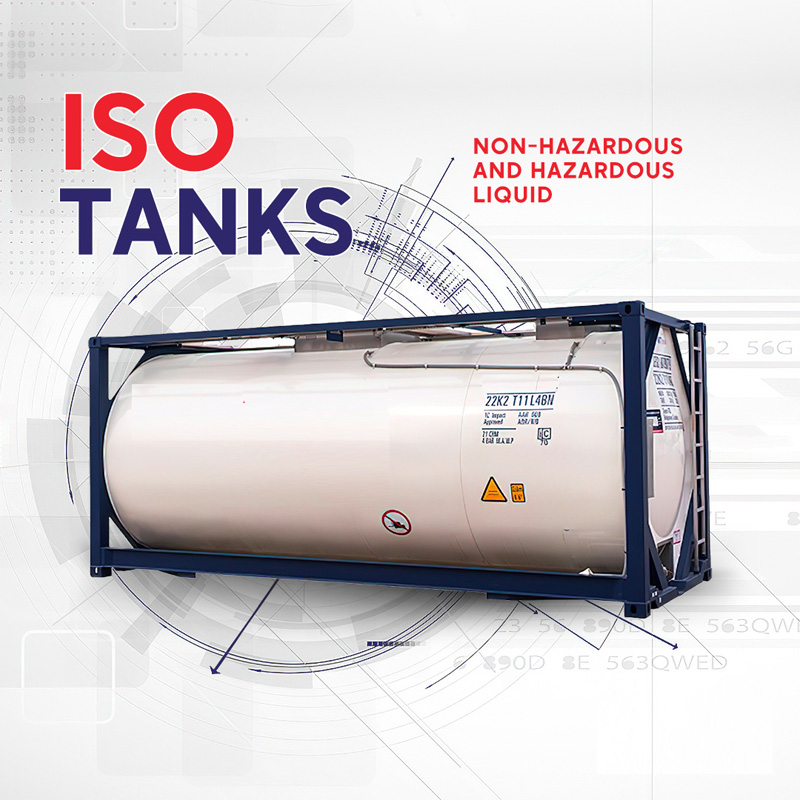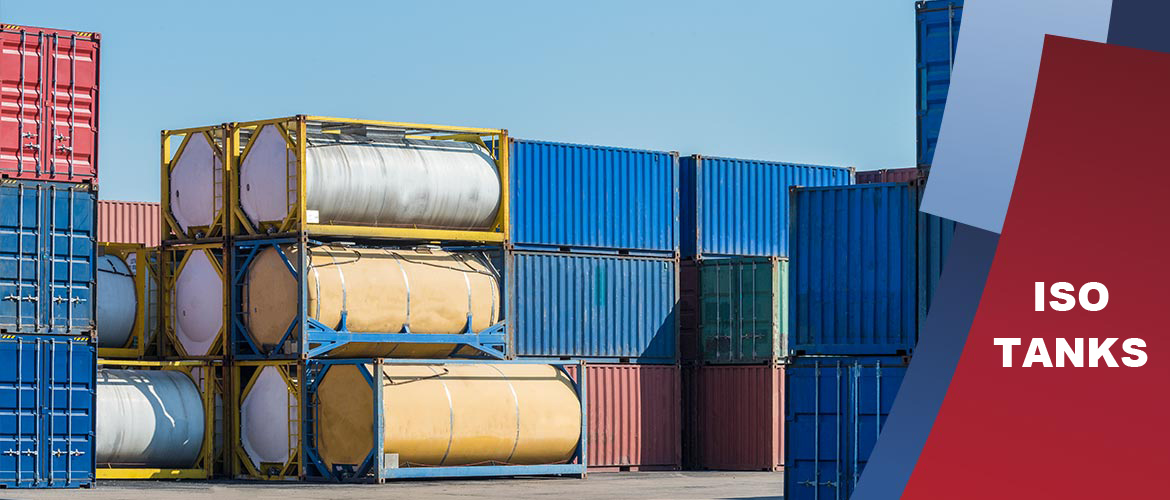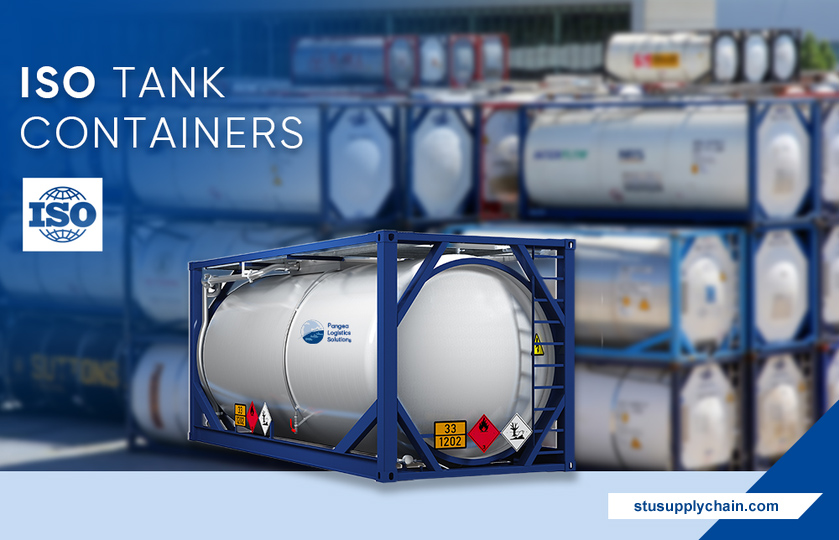NEWS & BLOG
Views: 1582 Author: Site Editor Publish Time: 2022-11-17 Origin: Site
ISO tank also known as ISO tank container. ISO tank containers are used to transport and store hazardous and non-hazardous materials such as liquids, powders and gases. ISO tanks are made of stainless steel and feature insulation as well as aluminum or polyurethane protective layers. This makes them a safe choice for transporting a variety of materials. The size of the tank is exactly the same as the size of a 20-foot container, easy to transport by sea.

ISO Tank containers store and transport both hazardous and non-hazardous goods. Now, let's take a closer look at what can be shipped in ISO tanks.
Here are some of the most commonly-shipped goods:
- Liquids
- Gases
- Powders
- Chemicals
- Perishable and non-perishable foods
- Alcohols
- Non-alcoholic liquids
- Petrochemicals
- Fuel such as petrol, diesel, and compressed natural gas (CNG)

- General chemicals or non-chemicals liquids
- Class 2 gases (special tanks for gases are usually bought by the factory itself, or rented all year round, generally there is no short term rental)
- Class 3 hazardous products such as ethanol, methanol, etc.
- Class 5.2 hydrogen peroxide (special tanks for hydrogen peroxide are available)
- Class 6, Class 8, Class 9 and other low-risk hazardous materials
ISO Tank Transportation Ways
The structure of the ISO tanks is a combination of a container and a tank, in such a way that it resembles a 20FT container from the outside, but its loading/discharge is of a tank type.
Transportation of liquids is attainable in three ways:
1- Using a barrel and shipping by container in a container ship
2- Transporting in bulk and with bulk tanker ship
3- Transporting with an isotank in a container ship
Transportation of gases is possible in two ways:
1- Transporting with an isotank in a container ship
2- Transporting in bulk and with bulk tanker ship
Advantages
- ISO tank containers can travel by land, ground and sea making them a great option for import and export shipping requirements.
- ISO tanks are a lower cost alternative to liquid bulk tanker transport.
- ISO tasnk are much less expensive to store on-sight than a full tanker truck.
- ISO tank containers do not suffer from the same capacity restraints as the liquid bulk trucking market.
- ISO tanks save fuel and reduce carbon dioxide emissions by up to 70%.
- True direct access from loading point to unloading point
- No leakage and evaporation of cargo
- The loading capacity is larger than the normal container loading capacity
- More environmentally friendly, no need to dispose of the waste hazardous materials packaging, just recycle or professional location cleaning
- Very high safety
Disadvantages
- As a kind of extraordinary packaging, the packaging cost is more expensive than the ordinary barrel
- If you need to recycle, then you need to pay the return shipping cost

- Highly corrosive products, few tank owners are willing to rent short term, such as high concentration of sulfuric acid, sodium hydroxide solution, although this product is classified as class 8, but because of its highly corrosive, so it will lead to difficult to rent to ISO tank container, this product is best or manufacturers to provide their own.
- There are special odors, particularly difficult to clean products such as dimethyl disulfide such rotten egg smell, and particularly difficult to clean the product, the tank owner will generally increase the price of the tank set.
- Some products can be volatile at room temperature and may be dangerous when reloading, so such products need to be filled with inert gas and sealed when using ISO tank containers for transportation.
- ISO tank containers are not exportable by any manufacturer, even if they are qualified for production. Because the port of Shanghai when exporting canned dangerous goods, filling manufacturers need to record in the customs, only qualified manufacturers can do the record.
According to standard ISO tank specifications, a cylindrical pressure vessel is normally surrounded by a 20' x 8' x 8.6' steel framework. This is the overall international standard dimensions of a container that is transporting both hazardous and non-hazardous liquids in bulk.
| Capacity (nominal) | 21,000 litre | 24,000 litre | 25,000 litre | 26,000 litre (baffle) |
| Design Type | UN PT / Hybrid | UN PT / Hybrid | UN PT / Hybrid | UN PT / Hybrid |
| Discharge Outlet | Bottom | Bottom | Bottom | Bottom |
| Max. Gross Weight | 36,000 kg | 36,000 kg | 36,000 kg | 36,000 kg |
| Tare Weight | 3,650 kg | 3,900 kg | 3,730 kg | 4,060 kg |
| Max. Payload | 32,350 kg | 32,100 kg | 32,270 kg | 31,940 kg |
| Test Pressure | 6.00 Bar | 6.00 Bar | 6.00 Bar | 6.00 Bar |
| Working Pressure | 4.00 Bar | 4.00 Bar | 4.00 Bar | 4.00 Bar |
| Max. Cargo Temp. | 120°C | 120°C | 130°C | 130°C |
| Steam Heating Coil | 8 m² | 8 m² | 8 m² | 8 m² |
| Baffles | N/A | N/A | N/A | Yes x 3 |

The tank owners will firstly allocate a certain amount of tank container reserve in their advantageous ports and rely on their foreign agents to complete a series of operations such as renting, returning and washing the containers.
In the rental of tanks, choose the tank owner of the advantageous route, not only to save rental costs, but also to ensure the safe transportation of goods, the default ISO tank is 7 days free of containers at the port of origin + 14 days free of containers at the port of destination.
As with conventional dangerous goods booking, dangerous goods tank booking is basically to provide booking power of attorney + MSDS + box certificate (conventional dangerous goods provide dangerous bag certificate or pot inspection certificate).
It is like the ID card of the tank, which contains all the information you want to know, including tank number, tank volume, tare weight, maximum load weight, large stacked weight, manufacturer, holder and other information.
ISO tank container filling goods are basically used in the form of door point trailer, because the production companies will have a special filling workshop, first of all, to ensure that the goods in the canning process is not contaminated, filling safety is also greatly improved.
ISO tank container is generally limited by weight, can only do single tow, so ISO tank container trailers are often based on short board collection trucks, long board trucks can only be placed on the cans near the side of the cab or in the middle, absolutely can not be placed on the back side of the heavy cans, otherwise it is easy to cause the board unstable during the trip resulting in the fall of the tank container.
The ISO tank container declaration is similar to the general dangerous goods declaration, and the tank certificate is an important document to be declared.
Take the dangerous goods in the seaport as an example, distinguish the foreign port (first port and then customs declaration, also can be pre-declared) combined with the port requirements for dangerous goods direct loading, according to the plan to send the port or direct loading can be safely on board.
Because the use of tank transport, to rely on the cooperation of the tank owner and freight forwarder, so generally are signed by the agent bill of lading (HBL) more convenient agent clearance, of course, also directly to the actual consignee or consignor to sign the shipping company bill of lading (MBL), freight forwarder to do agent customs clearance.
Professional dangerous goods TANK tank container transport operation difficulties, mainly in the TANK tank container leasing, cleaning, maintenance, booking, dangerous declaration, customs clearance, door point trailer, drop box, foreign DDU / DDP, import customs clearance and other operations, due to their own characteristics and ordinary containers are different, the operation or some nuances.

STU Supply Chain specializes in bulk liquid ISO tank container shipping services (both hazardous and non-hazardous chemicals) and our staff has the expertise to meet all your operational needs regarding ISO tank.
The available tank types are IMO-1, IMO-2 and food grade containers. All tanks are inspected and approved by: ABS - American Bureau of Shipping, Bureau Veritas, Lloyd's Register, RID and ADR.
We have 100+ tanks and cooperate with many international tank owners to ensure the demand of tanks and cooperate with many tank yards.
We have long-term cooperation with various shipping lines, tank owners, fleets, terminals, customs clearance, inspection and other suppliers to meet the various business needs of our customers.
We shipping goods from China to worldwide by sea. Loading ports of Shenzhen, Guangzhou, Shantou, Shanghai, Qingdao, Dalian, Tianjin, Ningbo, Xiamen, and Hong Kong. With such a comprehensive service, you can get the best technical support and reliable equipment. Pls contact us if you need.
